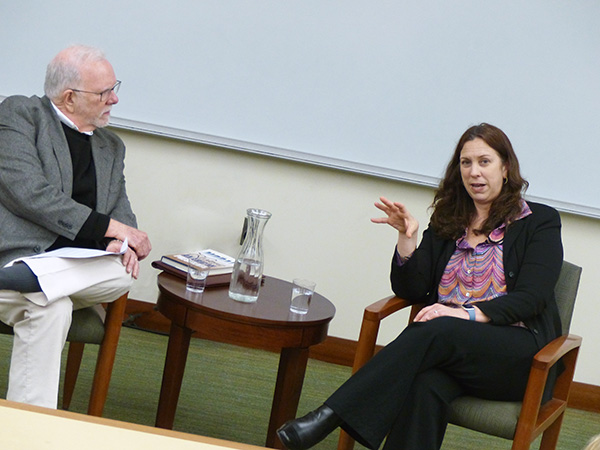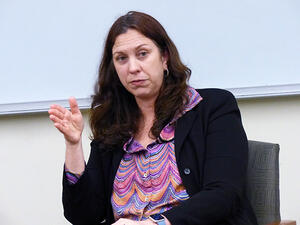Preserving Democracy, One Record at a Time: U.S. Archivist Colleen Shogan Returns to Yale

Even in our increasingly digital world, many office jobs still involve some tree-derived paperwork. Printers that need toner, documents to sign with ink, labels on folders in filing cabinets.
At her current job, Colleen Shogan, Ph.D. ’02, is responsible for preserving and providing access to 13.5 billion physical records, including some with notable signatures: the Declaration of Independence, the U.S. Constitution, and the Bill of Rights.
In May 2023, Shogan swore an oath to become the 11th archivist of the United States, the first woman appointed to head the National Archives and Records Administration and direct its 2,600 employees at 42 facilities across the country.
Last week, Shogan returned to Yale for a public conversation with her dissertation advisor, Stephen Skowronek, hosted by the Institution for Social and Policy Studies’ Center for the Study of American Politics.
“I received the best possible education that I could have ever received,” Shogan told a full room at ISPS. “And I don’t think I would have ever made it to the position that I am in now if I didn’t have a Ph.D. in political science — and certainly the specific experiences that I had here at Yale.”
Shogan said she regularly applies a working knowledge of history to help her understand the motivations behind policy decisions and guide how she follows laws governing the handling of federal documents, such as the Presidential Records Act. And she said that her command of research methodology has helped her interpret reports and memos outside her area of expertise, particularly when serving as assistant director and then deputy director of the Congressional Research Service.
“If you have sound training and done that type of work, then you’re able to read very widely and contribute to the discussion even if you’re not an expert in that particular policy area,” she said.
Skowronek said that Shogan’s former teachers and colleagues in the Political Science Department were not surprised by her career trajectory.
“It was evident to us from the start that she was an unstoppable force destined for great things,” he said, praising her academic book on presidential moralizing and her series of novels featuring a murder-mystery-solving congressional staffer. “We’re honored by her presence.”
After working at the Congressional Research Service, Shogan served in leadership positions at the Library of Congress as well as vice chair of the Women’s Suffrage Centennial Commission and senior vice president of the White House Historical Association.
Alan Gerber, ISPS director and Sterling Professor of Political Science, welcomed Shogan back to campus and said she exemplifies the potential for joining imaginative, rigorous scholarship with public service.
“The National Archives are an unparalleled resource for students of American politics and history,” he said. “It is remarkable good fortune for everyone that a leader with Colleen’s talent and background is stewarding the management of this national treasure.”
In addition to the nation’s founding documents and papers preserved in presidential libraries, the National Archives works with every federal agency to develop records schedules about what materials will be preserved in perpetuity. Increasingly, this includes the tremendous growth of digital records, such as emails and text messages sent and received from senior officials.
It’s a job Shogan said she treats with great care and reverence.
“Our records have been important for the entire history of the republic,” she said. “But I can’t think of a more important time in which they are more critically important for the health and continuation of our democracy. Because if we don’t have records, we don’t have transparency — we don’t have accountability. And we have to have accountability in a democracy.”
Shogan said one of her major objectives is to grow the agency’s budget to accommodate the “onslaught” of digital records, including social media posts, digital photography, and videos. Scanning current physical documents and building the technological infrastructure necessary to handle all digital records will not only preserve the documents for accountability and research but broaden access for groups who might not have the capacity to easily examine the originals.
For example, on a trip to Seattle, Shogan said she met with Native American tribal elders from Alaska who wanted easier access to treaties and other agreements with the government currently housed in Seattle.
“We are engaged with a lot of communities who have previously been underserved, to make sure we are prioritizing their priorities,” she said.
She has also spearheaded efforts to preserve the Emancipation Proclamation and, once she has raised sufficient private funding to construct a suitable case, place it on permanent display in the National Archives’ Rotunda for the Charters of Freedom.
Shogan is currently planning events and activities to celebrate the 250th anniversary of the Declaration of Independence in 2026, including the distribution of educational materials for children, 24-hour access to the rotunda in the week leading up to July 4, and online experiences for people across the country.
Shogan also wants to conduct conversations about the document’s meaning and the need to address “the continued fulfillment of rights.”
“This is a good time for reassessment,” she said. “We’re 250 years in. Where does the next 50, 100, 250 years take us? Because this is a continuous experiment.”